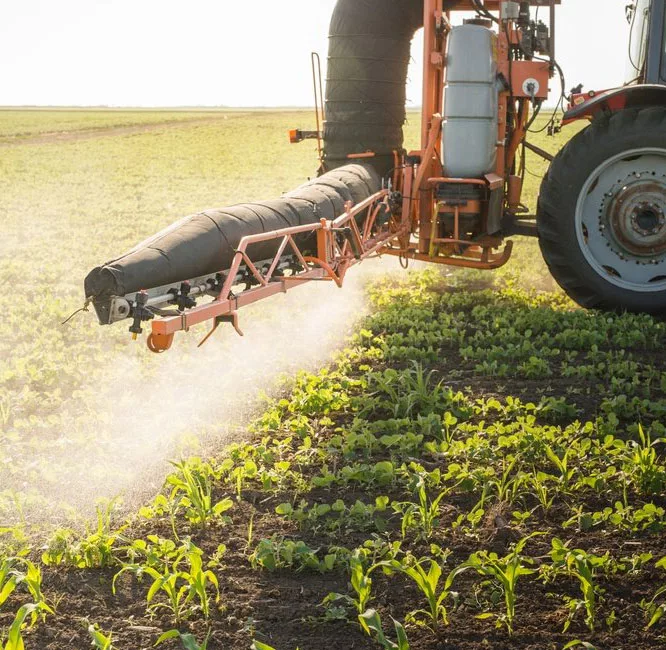Sometimes the greatest challenges in life teach us the greatest lessons, and losing some of my finest horses in life has taught me a lot. Here at Thunderbrook, we have found metabolic changes correlate with exposure to certain chemicals in our horses’ environment. Not too hard when we are surrounded 360 degrees by arable farming and when you see how directly the crop spraying impacts on our animals and land. We have just had 6 days of chemical spraying in the last 30 days. Here you can see how close the sprays are and how they can drift across directly onto our horses. If left to deal with this alone, two of our mares go into acute laminitis within 2 to 6 hours, when certain chemicals are applied. Like us, many people cannot just sell up and find their perfect organic smallholding on a mountainside. So we have had to learn to deal with the effects of chemical spraying on our herd…….and that is how Thunderbrook Equestrian began, and how we continue to learn.
The chemical sprays recently applied adjacent to us include certain weedkillers, insecticides, fertilisers and mineral applications. But they are safe aren’t they? No. Through working closely with our neighbouring farmer and keeping records we have learnt that certain sprays affect the horses adversely whereas others do not appear to do so. There are no official safety studies carried out with horses in these circumstances, but based on our field studies and available laboratory studies, we believe they certainly should be. Many weedkillers are excellent killers of the good bacteria in your horses gut. These bacteria are essential to maintain healthy metabolic and immune system functions. Many weedkillers are detrimental to endocrine (hormone), liver, and other functions. Most weedkillers are excellent mineral chelators – binding and inactivating essential minerals. It’s not just the active ingredient chemical in the weedkiller used, it is the cocktail of other adjuvants, emulsifiers, water softeners, etc used in the formulation too. So how do we deal with such intense chemical exposure here at Thunderbrook?
Firstly we have a system whereby our neighbour notifies us when they are going to spray, and what with. Where possible the horses are brought into their stables, top doors closed and kept in until all spray has subsided (usually the rest of the day). Field water troughs are cleaned out and freshwater supplied (the sprays contaminate the water tanks – we know because we have tested). We do have supplements to try and help remediate the effects of chemical exposure, like Gut Restore, Liquid Boost and Liquid Gold. But we have found protection is better than cure, and hence we developed EquiCarb.
This activated carbon/medicinal clay/medicinal gum blend was developed to have the highest toxin binding capacity for the types of chemicals we have found to cause the biggest problems with our herd. Chemicals like glyphosate, nitrates, chlorine, fluoride, and so on. Here in photo 1, you can see the application of crop sprays and how close to our paddocks they are applied. In photo 2 you can see some of the Thunderbrook research herd eating their feed with 200g of EquiCarb added, just prior to the spraying taking place. They were also moved to the furthest field possible, away from the chemical sprays. So far, the result has been quite encouraging. We still see some metabolic changes after certain sprays are applied, but we are not seeing the ‘metabolic crashes’ and acute laminitis that we experienced previously. You may or may not agree with this Facebook post. But please think a little more ‘out of the box’ and question when chemical sprays are used and when your horse’s health deteriorates. The barefoot community is questioning iron-rich forage, iron in feeds, mineral balancing, sugar and starches and all other concoctions that can be made into supplements. But if chemicals used in farming and food processing can kill good bacteria and chelate (inactivate minerals) then why can’t these be the bad guys, responsible for or contributing to, our horses ill health? Start to keep a diary. Do you find a correlation too? Knowledge is important. Education helps horse owners to understand and to question mainstream thinking (which is not always correct). Please share.
This blog is part of an archived library. These blogs were originally written from 2009 through to 2014, so some are over a decade old (apologies the exact dates have been lost on website updates). Research and informed opinions are a constantly evolving stream of work, so there will always be updates required to any older blog post, research paper, etc. For the latest information, please email info@thunderbrook.co.uk or telephone 01953 797050 for nutritional advice. Thank you.

